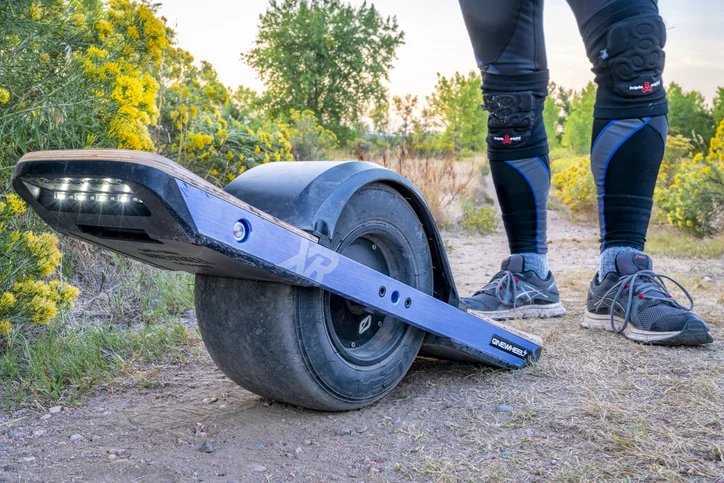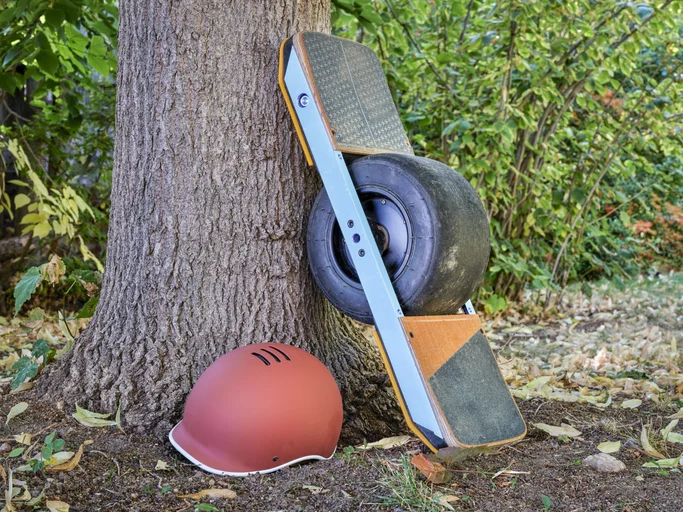You may be entitled to recover compensation and our legal team can help. Please click the button below for a Free Consultation or call us toll-free 24 hrs/day for legal advice by dialing (866) 588-0600.
Onewheel Accidents Lawsuit Overview
The popular self-balancing skateboard, One-Wheel, revolutionized the industry when it first became available in 2015; however, the single-wheel board has since caused many riders to endure severe personal injury and even death as the result of a product defect.
Onewheel devices are battery-powered vehicles made by Future Motion that allow riders to stand on a skateboard-like deck propelled by a single tire.
These self-balancing boards use gyroscopes and accelerometers to help riders balance and steer using their weight and positioning, with some models like the Onewheel XR capable of reaching speeds up to 20 mph or more.
According to many clients, during ordinary use, the one-wheel board is prone to sudden stops, which deactivates the intended balancing technology that actively helps the device, causing it to take a nosedive and launching the rider forward.
In some cases, this defect has caused the board to stop while the rider is traveling at high speeds, resulting in severe injuries and even wrongful deaths.
Latest Onewheel Accidents Lawsuit Updates
- August 11, 2022 - Future Motion Inc. recalled about 20,500 footpads for Onewheel GT Electric Skateboards after the company received at least 813 reports of the skateboards continuing to operate after the rider has dismounted, including 11 reports of injuries including bruises, friction burns, and a twisted ankle [1].
- September 2020 - Another complaint involved an accident in which a man from New York suffered head and brain injuries, as well as "facial fractures, broken ribs, a broken right arm, and a punctured lung caused by his forward ejection from the Onewheel skateboard and contact with the pavement," according to attorneys [2].
- August 2020 - The first wrongful death lawsuit was filed by the wife and son of a San Diego man who died of serious injuries when his Onewheel shut off and nosedived while he was riding it in a park [3].
Reports and Statistics on Onewheel Accidents Cases
The U.S. Consumer Product Safety Commission (CPSC) has reported significant safety concerns with Onewheel devices [1]:
- At least 813 reports of the skateboards continuing to operate after the rider has dismounted.
- 11 reported injuries (in relation to the footpad recall) including bruises, friction burns, and a twisted ankle.
- At least 3 reported deaths from Onewheel nosedive accidents.
- Future Motion has been hit with multiple lawsuits alleging design defects.
The footpad can fail to disengage after the rider has dismounted while the board is in motion and the skateboard can unexpectedly continue to operate, posing an injury hazard to bystanders. CPSC said.
Related Article: Hoverboard Lawsuit & Lawyer Info
Onewheel Accidents Injuries
Onewheel accidents have resulted in a range of serious injuries to riders:
- Fatal Injuries: At least three deaths reported from Onewheel nosedive accidents
- Head and Brain Injuries: Multiple reports of traumatic brain injuries, including a major head injury case in San Diego
- Facial Trauma: Facial fractures and lacerations from forward ejection
- Broken Bones: Reports of broken ribs, broken arms, and other fractures
- Internal Injuries: Including a punctured lung in one New York case
- Soft Tissue Injuries: Bruises, friction burns, and sprains
When a one-wheel skateboard powers off during use, the front-facing side of the board falls forward and creates a wedge between the product and the ground. The rider is then propelled from the board into the air, which can result in a deadly injury if they land on their head or neck.
Understanding Onewheel Design Issues
According to many clients, during ordinary use the one-wheel board is prone to sudden stops, which deactivates the intended balancing technology.
The accidents result from what some injured victims describe as the One-Wheel's "pushback" defect, which is designed to notify riders when they're approaching the limitations of the device.
The lawsuits allege several design defects:
- Sudden stops that deactivate balancing technology
- Nosedives at high speeds
- Failure to properly warn of inherent risks
- Continuing to operate after a rider dismounts (footpad issue)
Unlike traditional skateboarding, there's not much the rider can do once the product powers down, and even highly experienced one-wheel riders have sustained traumatic injuries because of the defect.
Do You Qualify for an Onewheel Accidents Lawsuit?
While Schmidt & Clark, LLP is no longer taking these cases, generally, you may qualify for a Onewheel accident lawsuit if:
- You experienced injuries while riding a Onewheel device
- Your injuries required medical treatment
- The accident was potentially caused by a device malfunction
- You have documentation of your injuries and the incident
- You are within the statute of limitations for filing a product liability claim in your state
Evidence Required for an Onewheel Accidents Lawsuit
If you're considering legal action, you should gather:
- Medical records documenting your injuries
- Proof of Onewheel purchase (receipts, registration)
- Photos of injuries and the accident scene
- The Onewheel device itself (do not modify or repair it)
- Witness statements if available
- Any communications with Future Motion
Damages You May Recover
A successful Onewheel accident lawsuit may provide compensation for:
- Medical expenses (past and future)
- Lost wages and diminished earning capacity
- Pain and suffering
- Emotional distress
- Wrongful death damages (in fatal cases)
Onewheel Recall Information
Recall Date: August 11, 2022
Products Affected: About 20,500 footpads for Onewheel GT Electric Skateboards
Recall Reason: "The footpad can fail to disengage after the rider has dismounted while the board is in motion and the skateboard can unexpectedly continue to operate, posing an injury hazard to bystanders," CPSC said.
Sale Period: The recalled skateboards were sold online and at authorized independent dealers nationwide from March 2022 through August 2022 for about $2,200.
Statute of Limitations for Onewheel Accidents Lawsuits
The statute of limitations for product liability claims varies by state but typically ranges from 1-3 years from the date of injury.
Some states have "discovery rules" that may extend this time frame if you could not reasonably have known the cause of your injury until later.
It's important to consult with a qualified attorney promptly to ensure you don't miss critical filing deadlines.
FAQs
Get Your Free Onewheel Accident Lawsuit Evaluation With Our Lawyers
While Schmidt & Clark, LLP is no longer accepting Onewheel accident cases, if you believe you have a valid claim, you should:
- Research attorneys with experience in product liability and personal injury cases
- Look for firms that have handled similar personal transportation device cases
- Consult with multiple attorneys to find the right fit for your case
- Ask about their fee structure (most work on contingency basis)
- Check their track record with similar cases
Time limitations apply to filing product liability claims, so it's important to seek legal advice promptly after an injury.
References:
- https://www.cpsc.gov/Recalls/2022/Future-Motion-Recalls-Footpads-for-Onewheel-GT-Electric-Skateboards-Due-to-Bystander-Injury-Hazard-Recall-Alert
- https://dailyhornet.com/2021/onewheel-lawsuits-pile-up-after-deadly-nosedive-accidents/
- https://www.prnewswire.com/news-releases/new-lawsuit-claims-onewheel-nosedive-responsible-for-san-diego-mans-wrongful-death-301311002.html

 Published by
Published by 


